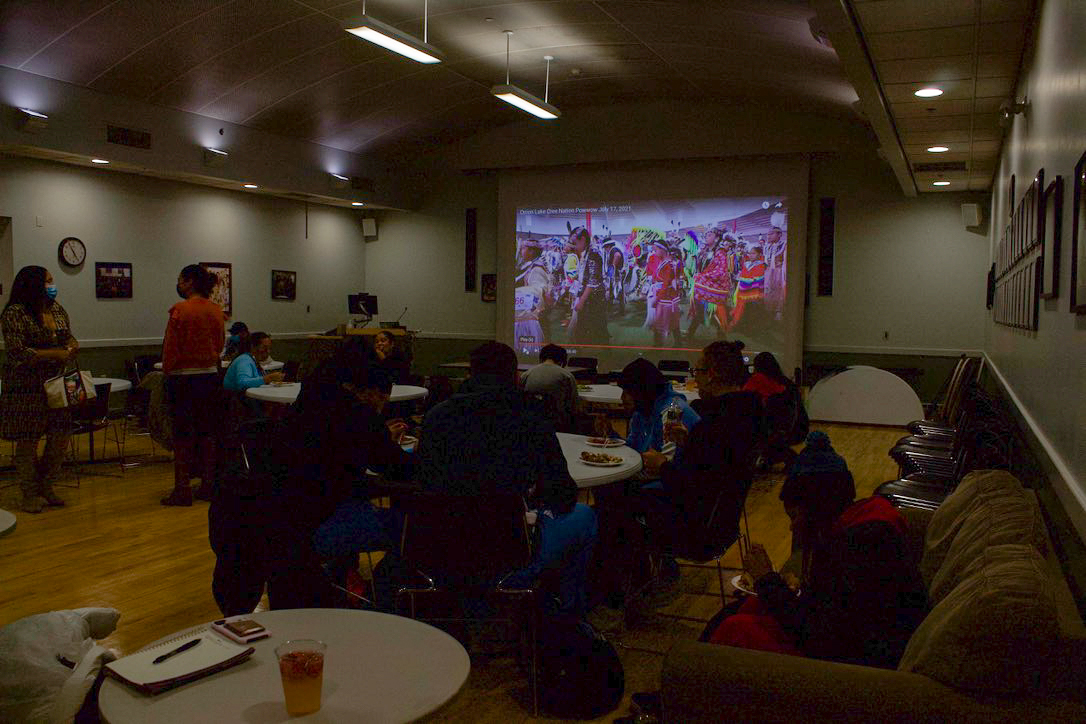Multicultural Student Services Center hosts community event calling for an end to violence against Indigenous people. PHOTO CREDIT: Hannah Charron
For Native American Heritage Month, the University of Rhode Island Multicultural Student Services Center hosted a panel discussion focused on calling an end to violence against Native American women on Nov. 16.
The panel, entitled “The Silent Genocide: Missing and Murdered Indigenous Women,” was moderated by Lorén Spears, the executive director of the Tomaquag Museum.
Spears opened the lecture by acknowledging that the discussion was taking place on Narragansett land. She then blessed the food provided by Sly Fox Den Too, a restaurant that serves authentic Indigenous cuisine.
Spears introduced Kali Reis, a professional boxer, who spoke about using her platform and career to spread awareness about missing and murdered Indigenous women.
She then introduced the three panelists — Wanda Hopkins, a senior enrollment service representative at URI, Vange Hopkins, a student at URI and the daughter of Wanda Hopkins, and Bella Noka, a Narragansett tribal elder. Spears asked Noka to show the room the mask she was wearing, a red handprint over the mouth.
“[It represents the] silence of media and law enforcement amidst a crisis,” Noka said.
The panelists first discussed the portrayal of Indigenous women in the media.
“This crisis has been years in the making,” Wanda Hopkins said. “It began when the settlers first came into the country. They considered our women dirty and began to categorize them as sexual objects.”
Vange Hopkins acknowledged the impact social media has had in regards to helping the problem, including the spreading of knowledge through hashtags like #MMIWG2SP, which stands for missing and murdered Indigenous women, girls and two-spirit people.
“Misrepresentation goes with misinformation,” she said. “From a young age, your perception of Natives is altered.”
She mentioned stories like Pocahontas, which shows a romantic relationship between a preteen and an adult, harmful racist portrayals and stereotypes and overall inaccuracies about Indigenous history.
Spears asked the trio about modern-day advocacy, and Noka said everyone is responsible for their own actions about injustice.
“We’re adults,” Noka said. “If you see people disrespecting a culture and you don’t do anything or you participate, that’s on you.”
Vange cited an example of progress on the governmental front: Operation Lady Justice, which is a task force established by U.S. President Joe Biden to improve safety issues for natives and address the countless missing and murdered Indigenous people around the country.
Spears invited the panelists to speak about anything they wanted to share, including Indigenous ceremonies.
“In order for us to heal as Indigenous people,” Spears said, “the intergenerational and historical trauma that has befallen on our people through what we’re talking about tonight— the devaluation of Indigenous life through the conquest and colonization, through the forced assimilative practice, through boarding schools and the forced acculturation— I think what makes us able to get through this is our elders who continued ceremony.”
Vange Hopkins spoke about the importance of powwows, of people coming together to celebrate through culture, song and dance, and how the absence of the missing and murdered Indigenous people impacts families during these events.
“I think about the people who aren’t celebrating with their loved ones,” she said.
Wanda Hopkins also acknowledged the people and how quickly someone can be taken from your life.
“Take your life seriously and love the people in your family,” she said, “especially your mothers and grandmothers.”
Noka spoke about the importance of character above all else, including education or money. She said that there are people everywhere with degrees and successful careers who are bad people.
“There is no college that teaches you spirit,” Noka said. “That comes from being a good person.”
Noka mentioned the importance of healing and how the ocean is the most effective medicine. She said it sustains Indigenous people, but encouraged anyone to use its healing properties.
“The first thing you do when you see the ocean, I want you to jump into that ocean, especially if you’re in any kind of pain, physically, emotionally or spiritually,” Noka said. “Because grandfather ocean, when you get in there he’s going to reach places that you can never reach, and he’s going to heal you from the inside out.”
“Every one of you,” Noka encouraged at the end of the lecture, “jump in that ocean.”





